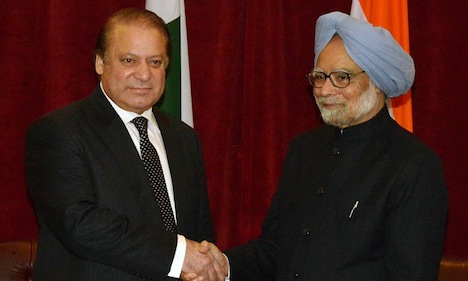Pakistani prime minister Nawaz Sharif and Indian prime minister Manmohan Singh met as planned in New York Sunday morning to discuss bilateral relations — even after 12 Indians were killed by suspected Pakistani terrorists in Kashmir last week. ![]()
![]()
Accordingly, the resulting understanding between the two was far wider than a mere handshake of the kind rumored last week to be in the works between US president Barack Obama and Iran’s new moderate president Hassan Rowhani:
The leaders agreed that their military chiefs should meet and investigate any attacks in disputed border regions in order to prevent a recurrence, Pakistani Foreign Secretary Jalil Jilani told reporters after their one-hour breakfast meeting, held three days after the latest deadly raid in Kashmir. Jilani didn’t specify when the military officials will meet.
The two also invited each other to their respective countries, Indian National Security Adviser Shivshankar Menon said after yesterday’s meeting. “We have actually achieved a new stage and now have some understanding of how to improve going forward and I think that is an advance on one and a half years ago,” Menon said.
It’s important to note that both sides downplayed the significance of the meeting, but there’s reason for optimism — if such a strong statement resulted as a formal matter from the meeting, there’s reason to believe that Sharif and Singh could have discussed and agreed on much more. Sharif, in addition, agreed to ‘movement’ on Pakistan’s role in the 2008 Mumbai terrorist attacks.
Sharif only began his third term as prime minister in June 2013, but he has indicated he wants to strengthen relations that have been strained since Partition in 1947 — primarily over India’s control of the provinces of Jammu and Kashmir along the Pakistani-Indian border, over which the two countries have gone to war twice. In an address earlier this week to the General Assembly, Sharif said that the nuclear arms race between the two countries was a waste of massive resources.
Singh, who has been hesitant to embrace Sharif’s overtures and claimed earlier this weekend that Pakistan is an epicenter of south Asian terrorism, is in his final months after what will be a decade as prime minister in India, and he’ll be succeeded by May 2014 by either the Indian National Congress (Congress, or भारतीय राष्ट्रीय कांग्रेस) standard-bearer Rahul Gandhi, the fourth-generation scion of the party’s (and perhaps India’s) leading political family or the chief minister of Gujarat state, Narendra Modi, who will lead the conservative, Hindu nationalist Bharatiya Janata Party (the BJP, or भारतीय जनता पार्टी) into next spring’s elections and whose plucky style could mean a tense period for the bilateral relationship, given his alleged role in anti-Muslim riots in Gujarat in 2002.
So even though the meeting’s potential was always limited, there’s good reason to welcome it — for at least five reasons, as I argued over the weekend in The National Interest:
- Boosting regional security will be even more important as the United States draws down troops from the Af-Pak theater in 2014.
- Aside from Pakistan’s election in May, Iran’s election in June and India’s elections next year, Afghanistan will elect a president next spring and Bangladesh will hold elections in January. That means we could see five new leaders in the span of one year in southwest Asia, in addition to this year’s leadership transition in the People’s Republic of China.
- Greater ties between India and Pakistan could boost both countries’ underperforming economies. Freer trade is low-hanging fruit.
- The meeting can cement Sharif’s credentials as a strong — and democratic — leader as he contemplates who will succeed Ashfaq Parvez Kayani as the next army chief of staff.
- Finally, while the world cares more about the potential of a nuclear-armed Iran, it’s easy to forget that both Pakistan and India have had nuclear weapons for a decade and a half. Cooperation between the two countries not only improves regional stability, but global stability.

One thought on “Sharif, Singh meet in New York, agree to cooperate over terror attacks”